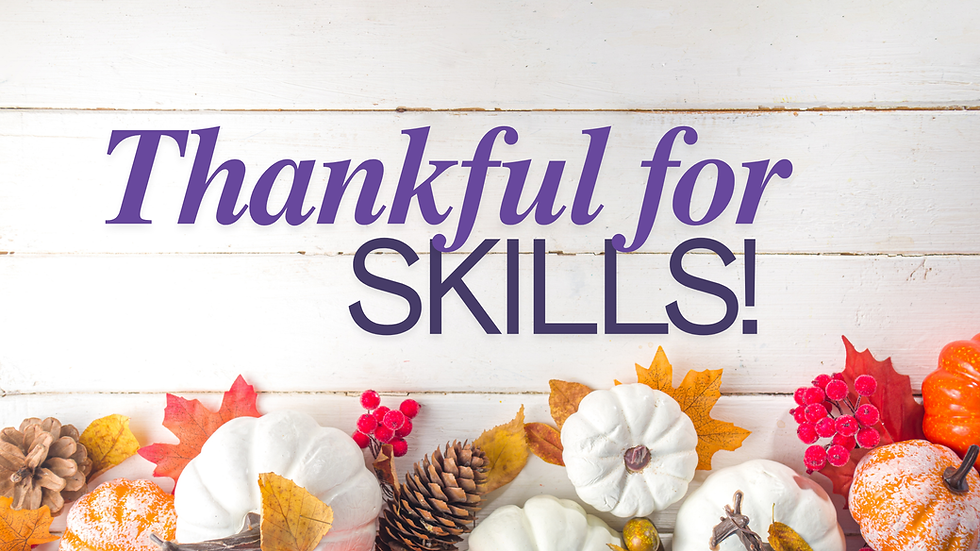Approaching May Mindfully
- the SILA Skills Group

- Apr 30, 2024
- 3 min read

As we approach May, a month dedicated to Mental Health Awareness, mindfulness takes center stage. What does mindfulness mean to you? For some, it may conjure images of deep meditation sessions and hours of focused attention, much like our son Tom's dedication to his practice.
One day, I returned home to find Tom seated in front of our antique sewing machine, engrossed in the word "SINGER" inscribed on it. He mentioned he had been there for over an hour, and when I asked why, his response struck me.
"It says SINGER, Mom," he remarked with a grin. "And that's what I focused on. After all, Mom, I am a singer!"
This simple yet profound moment made me think mindfulness seemed unattainable and impractical. I couldn't fathom dedicating hours to focusing on a single thing amidst my busy schedule.
mindfulness seemed unattainable and impractical
But here's the beauty of mindfulness—it is more straightforward and accessible than we often realize. I’ve learned that it involves directing our attention to one focal point, gently guiding it back when it inevitably wanders, all without judgment. It's about cultivating a purposeful and intentional presence in our daily lives, allowing us to navigate moments of stress and strong emotions with clarity and composure.
In my journey towards mindfulness, I discovered that it is a powerful tool to quiet the chaos in my mind. It enables me to be fully present and effective in my interactions with others, whether at work or home. It has been a transformative experience, enhancing my ability to connect with those around me and navigate life's challenges with grace.
it is a powerful tool to quiet the chaos in my mind
As we enter Mental Health Awareness Month, it's crucial to shift our focus beyond mere slogans and surface-level discussions. Let’s delve into truly understanding our own mental well-being and extend compassion and understanding to those around us who may be struggling.
One invaluable perspective shift that profoundly impacted my approach to my son’s mental health:
1. Approach with compassionate curiosity: We needed to approach him with compassionate curiosity and recognize that his words and actions were his truth. Arguing with him or trying to convince him to do better was not effective or helpful at that time.
2. Understand his struggles: It was crucial to see that he was doing his best at that time. His mental health challenges were not a choice; he was not intentionally trying to be manic or depressed. Putting expectations on him only made things more difficult for everyone involved.
3. Don't take behaviors personally: It was essential not to take his behaviors personally. His struggles were not about us; he wasn't trying to make us miserable. Instead, we needed to ask ourselves, "What is his story?"
4. Try again and try differently: We recognized that our current approach wasn't working and needed a different strategy. Continuing the same patterns while expecting different results was futile. We could navigate his challenges more effectively by accessing new tools and perspectives.
Instead of viewing his behaviors through a lens of judgment and criticism, this shift in perspective helped me approach him skillfully, recognizing that his struggles often stemmed from deeper underlying issues. This shift in mindset continues to allow me to foster genuine connection and empathy for all I encounter rather than perpetuating feelings of overwhelm and frustration.
View behaviors as a character fault OR skillfully, creating connection
Utilizing this perspective has been instrumental in my approach as a teacher. It enables me to engage with students, colleagues, and parents in a manner that minimizes stress for everyone involved. This strategy has helped me end each day with fewer regrets and encouraged positive reflection. Integrating this into my teaching practice has proven to be truly transformative.
I hope sharing my journey with you can inspire a mindful approach to this month and beyond. Let us be mindful of our mental health narratives and extend empathy and support to those we encounter each day. Remember, everyone has a story to tell, and by embracing mindfulness, we can cultivate resilience and forge meaningful connections.
If you're seeking to enhance your skills and deepen your understanding of mental health and mindfulness, consider attending a SILA Skills workshop. Together, let's embark on a journey of growth, resilience, and compassion.
Visit our website and subscribe today. You will receive a monthly newsletter with helpful information and news on current and upcoming training opportunities.




Comments